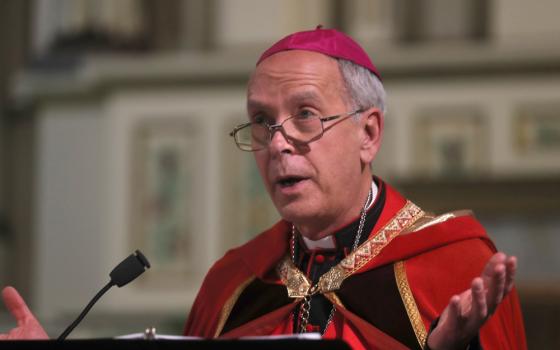Editor's note: Fr. Richard McBrien has been on hiatus since January because of health reasons. He is now feeling better and will resume writing his column, Essays in Theology, when he is able.
A fragment of a fourth-century papyrus, written in Coptic, makes some reference to Jesus' wife. It got front-page attention in The New York Times. The story seemed to have the approval of a professor at Harvard Divinity School in an academic paper she delivered recently in Rome.
Predictably, other newspapers and television and radio outlets were on their phones looking for comments from theologians and various religious spokesmen and spokeswomen.
Catholics and a large number of non-Catholics assume that there is a Catholic answer, and that it begins with some variation on the leading expression, "Of course not." They would be surprised if a Catholic began to answer in any other way. Sort of like a "man bites dog" response.
But only a conservative Catholic would expect there to be a Catholic answer to the question and would quickly excoriate anyone, especially a Catholic theologian, who might say otherwise.
In a subsequent opinion piece in The New York Times, Fr. James Martin, a Jesuit editor at America magazine, while noting that there wasn't much evidence in the New Testament or church history for the hypothesis that Jesus had been married, said he wouldn't be troubled one way or the other. Whether Jesus was married would make no difference to his faith in Jesus or his vow of chastity.
The controversy had reached a boiling point in various forms over the centuries, most recently with the discussion surrounding Dan Brown's novel The Da Vinci Code (2003) and the subsequent film version (2006).
I would agree almost totally with Fr. Martin. But unfortunately, many Catholics might assume that the vow of chastity and the promise of celibacy are one and the same. They are not.
Every human being is bound to practice the virtue of chastity, even if they might differ on its content and scope, whether vowed or not. On the other hand, the promise of celibacy is not in response to a divine command.
There are Catholic priests who are married (for example, ex-Anglicans and ex-Episcopalians who have become Roman Catholics and priests of the various Eastern rites) while thousands of Catholic priests of the Roman or Latin rite are indeed still bound by the man-made promise of celibacy.
If Jesus had a wife, however, the primary basis for obligatory clerical celibacy in the Roman Catholic Church would be out the window.
So the question is an important one after all. It affects thousands of priests in the Roman Catholic Church, including most of its pastors and associates, as well as priests who teach in our colleges, universities and high schools; the many who are chaplains in the military, in hospitals, and in prisons; the dwindling few who serve as editors of their diocesan newspapers and other publications; and priests in various special ministries.
The Vatican, however, has subsequently said in a sharply worded editorial published in the official Vatican newspaper, L'Osservatore Romano, that ample evidence existed to dismiss the papyrus as an "inept forgery" and "a fake."
Dr. Karen King, the Harvard scholar, did not imply in her paper that Jesus had been married, but she did suggest the question of his celibacy and marital status was a matter of debate among early Christians.
According to the Times, Dr. King has arranged to have the chemical composition of the ink tested at Harvard in mid-October. She said in an interview that the center at Harvard could not schedule the testing before she had presented her paper.
Where does that leave us? Pretty much where we were at the beginning of the most recent controversy. However, the issue remains important, even to the Vatican. The future of clerical celibacy in the Roman Catholic Church remains in the balance.
© 2012 Richard P. McBrien. All rights reserved. Fr. McBrien is the Crowley-O'Brien Professor of Theology at the University of Notre Dame.
|
Editor’s note: We can send you an email alert every time Fr. McBrien’s column, "Essays in Theology," is posted to NCRonline.org. Go to this page and follow the directions: Email alert sign-up. If you already receive email alerts from us, click on the "update my profile" button to add "Essays in Theology" to your list. |


